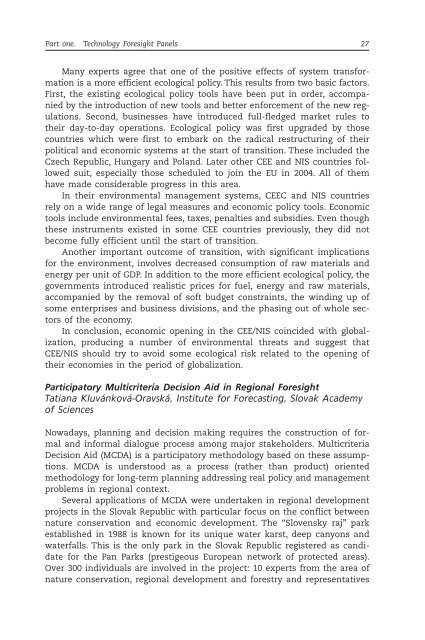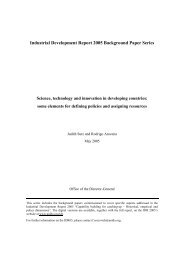TECHNOLOGY FORESIGHT SUMMIT - Unido
TECHNOLOGY FORESIGHT SUMMIT - Unido
TECHNOLOGY FORESIGHT SUMMIT - Unido
Create successful ePaper yourself
Turn your PDF publications into a flip-book with our unique Google optimized e-Paper software.
Part one. Technology Foresight Panels 27<br />
Many experts agree that one of the positive effects of system transformation<br />
is a more efficient ecological policy. This results from two basic factors.<br />
First, the existing ecological policy tools have been put in order, accompanied<br />
by the introduction of new tools and better enforcement of the new regulations.<br />
Second, businesses have introduced full-fledged market rules to<br />
their day-to-day operations. Ecological policy was first upgraded by those<br />
countries which were first to embark on the radical restructuring of their<br />
political and economic systems at the start of transition. These included the<br />
Czech Republic, Hungary and Poland. Later other CEE and NIS countries followed<br />
suit, especially those scheduled to join the EU in 2004. All of them<br />
have made considerable progress in this area.<br />
In their environmental management systems, CEEC and NIS countries<br />
rely on a wide range of legal measures and economic policy tools. Economic<br />
tools include environmental fees, taxes, penalties and subsidies. Even though<br />
these instruments existed in some CEE countries previously, they did not<br />
become fully efficient until the start of transition.<br />
Another important outcome of transition, with significant implications<br />
for the environment, involves decreased consumption of raw materials and<br />
energy per unit of GDP. In addition to the more efficient ecological policy, the<br />
governments introduced realistic prices for fuel, energy and raw materials,<br />
accompanied by the removal of soft budget constraints, the winding up of<br />
some enterprises and business divisions, and the phasing out of whole sectors<br />
of the economy.<br />
In conclusion, economic opening in the CEE/NIS coincided with globalization,<br />
producing a number of environmental threats and suggest that<br />
CEE/NIS should try to avoid some ecological risk related to the opening of<br />
their economies in the period of globalization.<br />
Participatory Multicriteria Decision Aid in Regional Foresight<br />
Tatiana Kluvánková-Oravská, Institute for Forecasting, Slovak Academy<br />
of Sciences<br />
Nowadays, planning and decision making requires the construction of formal<br />
and informal dialogue process among major stakeholders. Multicriteria<br />
Decision Aid (MCDA) is a participatory methodology based on these assumptions.<br />
MCDA is understood as a process (rather than product) oriented<br />
methodology for long-term planning addressing real policy and management<br />
problems in regional context.<br />
Several applications of MCDA were undertaken in regional development<br />
projects in the Slovak Republic with particular focus on the conflict between<br />
nature conservation and economic development. The “Slovensky raj” park<br />
established in 1988 is known for its unique water karst, deep canyons and<br />
waterfalls. This is the only park in the Slovak Republic registered as candidate<br />
for the Pan Parks (prestigeous European network of protected areas).<br />
Over 300 individuals are involved in the project: 10 experts from the area of<br />
nature conservation, regional development and forestry and representatives

















